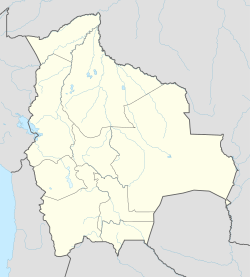San Ignacio de Velasco
| San Ignacio de Velasco | ||
|---|---|---|

San Ignacio de Velasco
|
||
|
||
| Location within Bolivia | ||
| Coordinates: 16°22′0″S 60°57′0″W / 16.36667°S 60.95000°WCoordinates: 16°22′0″S 60°57′0″W / 16.36667°S 60.95000°W | ||
| Country |
|
|
| Department |
|
|
| Province | José Miguel de Velasco Province | |
| Municipality | San Ignacio de Velasco Municipality | |
| Founded | 1749 | |
| Elevation | 410 m (1,350 ft) | |
| Population (2012) | ||
| • Total | 31,196 | |
San Ignacio de Velasco, San Ignacio, or SIV is the capital of the José Miguel de Velasco Province and the San Ignacio de Velasco Municipality in the Santa Cruz Department of Bolivia.
In 1996, the municipal government published the population as 12,600 persons. It is the largest city in Velasco, and the largest city between metropolitan Santa Cruz and the Brazilian border.
San Ignacio is located in the south-central region of the province of Velasco. It is connected to Santa Cruz via bus lines utilizing a dirt highway to San Javier in the province of Ñuflo de Chávez. From San Javier to Santa Cruz, the highway is paved. To the east, similar bus lines connect San Ignacio to the Brazilian city of Cáceres and utilized an unpaved road. The city has an airport (airport code SNG) with a dirt airstrip.
San Ignacio is located on the man-made lake, Guapomo, which also serves as the city's supply of fresh water.
Spanish is the most commonly used public language. Due to the proximity to Brazil, some Portuguese is spoken. The most common indigenous language in San Ignacio and surroundings is Chiquitano. Nearly all of the people of San Ignacio are indigenous or mestizo, i.e. Camba . Post-World War II German immigrants have a small presence, as do Mennonites.
The city is the seat of the Roman Catholic Diocese of San Ignacio de Velasco.
...
Wikipedia


